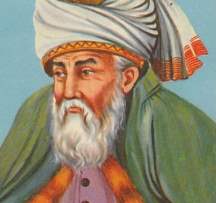Jalāl al-Dīn al-Rūmī (1207–73), the greatest mystical poet in the Persian language, was moved by mystical love to compose his lyrical, didactic poems.
His Divan Shams, attributed to his mystical beloved, Shams al-Dīn of Tabriz, as a symbol of their union, showcases Rumi’s unique, trance- like poetic style.
He was born in Balkh on the eastern edge of the Persian Empire. When Rumi was still a young man, his father led their family more than 2,000 miles west to avoid the invasion of Genghis Khan’s armies. They settled in present-day Turkey, where Rumi lived and wrote most of his life. He died in Konya, where thousands of visitors, of all faiths, visit his tomb each month, honoring the poet of legendary spiritual understanding. His disciples (in the Molavi Order) institutionalized an ecstatic dance (called the Samâ, means hearing) to forget the present and become united with the lover in infinity in a trance that is engendered by a constant spiraling movement to chants (zikr) and to the music of the ney (flute).

The most important influences upon Rumi, besides his father, who was also connected to the spiritual lineage of Najm al-Din Kubra, were the Persian poets Attar and Sanai.
Rumi expresses his own appreciation for them in the verses below:
Attar was the spirit, Sanai his vision,
We try to follow Attar and Sanai
Attar traversed the seven cities of Love,
We are still at the turn of one road


